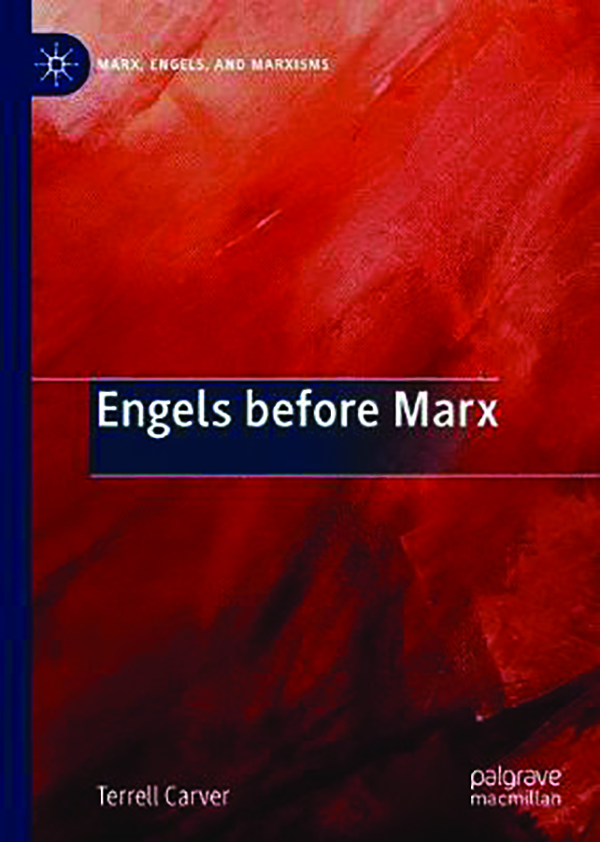Anyone who has taken an introductory course in political science knows that Karl Marx and Friedrich Engels wrote The Communist Manifesto (1848). But most of us know a lot more about one of those authors than the other. We can probably identify Marx as the father of communism and may be able to name some of his other books, such as Capital (1867). Some may have even seen his gravestone at London’s historic Highgate Cemetery. But when it comes to Engels, most of us draw a blank.
Terrell Carver, a professor of political theory at the University of Bristol and one of the world’s leading Marxist theorists, deftly attempts to fill this gap in our knowledge with his intriguing book Engels before Marx. By examining Engels’s early life, work, and career separately from his famous collaborator, Carver shows readers that communism’s other parent was a left-wing tour de force in his own right.

Carver starts his book with a simple question: “When was Engels?” In other words, when did the man who was so often obscured behind his co-author’s shadow acquire his own ideas and theories? Surprisingly, Marx’s so-called second fiddle was actually a lead violinist long before they ever met.
Engels was born on Nov. 28, 1820, in the Prussian town of Barmen. His father, Friedrich Sr., was a successful industrialist — he owned large cotton-textile mills in Barmen and in Salford, England — and, like Engels’s mother, Elise, a devout Protestant. Family correspondence shows that father viewed son “from a piously Christian and relentlessly commercial perspective” and always had “religious and social conformity in mind as the way to heavenly and earthly rewards.”
Engels never forfeited his wealth and inheritance, and he became a partner in his father’s firm in 1864. Nevertheless, it was clear from an early age his radical political pursuits would always be at the front of his mind. “His disdain for learning the family business,” Carver wrote, “folded into his disdain for philistines in general.”
As a young man, Engels developed what would prove to be a lifelong fascination with Georg Wilhelm Friedrich Hegel, the “recondite and highly academic” German philosopher. He enjoyed the satirical poems of authors affiliated with the Young Germany movement, including Karl Gutzkow, and plunged into the Romantic music of composers such as Robert Schumann and Felix Mendelssohn. While highly regarded today, these composers were viewed in their time as political reactionaries. The arts, wrote Carver, were the “proto-public place — limited, contested, censored, and problematic — through which authoritarian neo-medievalism was being challenged.”
Engels’s first published work, “The Bedouin,” was a poem Carver somberly describes as “an unremarkable evocation of a then fashionable orientalism.” He also started writing “Letters from Wuppertal” for the magazine Telegraph for Germany. This regular column, published under the alias “Friedrich Oswald,” provided him with a widely read forum to discuss the human condition.
“As a ‘stringer’ for a liberalizing newspaper,” Carver writes, “young Friedrich was quite a gift, and of course he was remarkably cheap, probably gratis, or nearly so.” His politics at the time, which involved critiques of factory work, child labor, capitalism, and religion, were radical but not revolutionary, “progressive and liberalizing, but not — apparently — utopian and visionary.” He made his name as a writer by bridging the gap between old, traditional values and new, radical concepts.
Engels attended the University of Berlin in 1841 and briefly joined the Young Hegelians, a group of radical German intellectuals who critiqued Prussia’s religious and political establishment. A year later, he moved to Manchester, England, to work at his father’s mill. There, Engels shifted “from the realm of parti pris but literary periodicals to independent publication as an autonomous, but of course pseudonymous pamphleteer.” During this short time period, he produced some of his finest individual work.
His 1842 pamphlet Schelling and Revelation critiqued the “pretentiousness” of Friedrich Wilhelm Joseph Schelling setting himself up as a “philosophical giant” against Hegel and other German idealists. He wrote “Letters from London” for the Rheinische Zeitung, which was edited by Marx (though the two had no personal connection at that point), and for the English-language New Moral World between 1843 and 1844. He was frequently critical of English and French socialists and complained that the theories of Adam Smith and Thomas Malthus were “subjected by the political classes in England to their selfish interests.” He wrote more about economic theory, private enterprise, monopolies, and landowners too.
When Engels was introduced to Marx and they began to work on their first book, The Holy Family (1844), their roles were reversed. Engels, then the more experienced and reputable of the two, was the lead author. Marx, Carver notes, “was miles behind,” with “just a couple of dozen genuinely published items, mostly in his own newspaper, and all quite brief, nothing even so long as a pamphlet.”
Later editions of The Holy Family would see the order of authorship switched. Marx, the political firebrand, had “run away with the project” after the first printing, and the more nuanced Engels “gave him license to do so.” The die had been cast by the two philosophers themselves, and history marched in a completely different direction.
Our society wisely rejected communism as a political alternative decades ago. But as we reach the 200th anniversary of Engels’s birth, it’s time to reconsider his role as an intellectual writer, thinker, and philosopher alongside Marx. There really were two fathers of communism, it seems.
Michael Taube, a Troy Media syndicated columnist and political commentator, was a speechwriter for former Canadian Prime Minister Stephen Harper.
